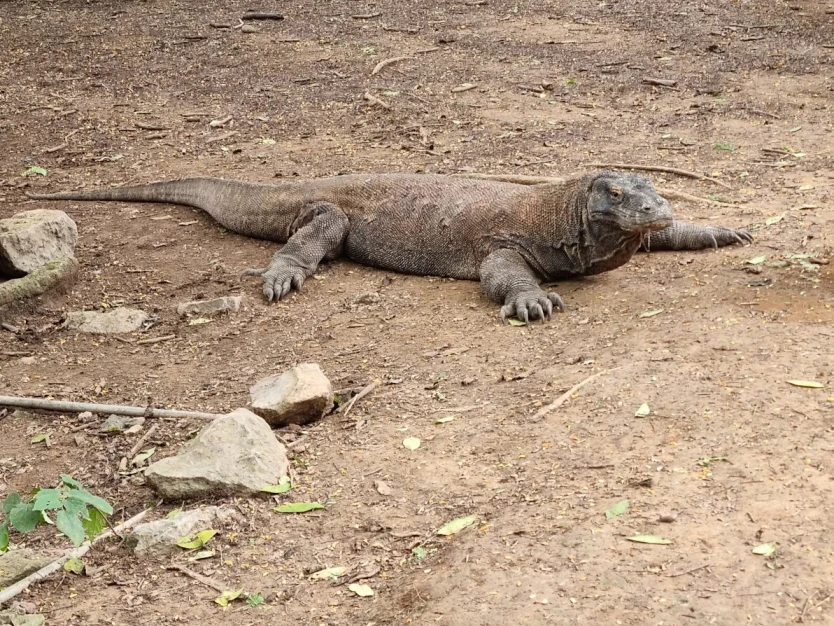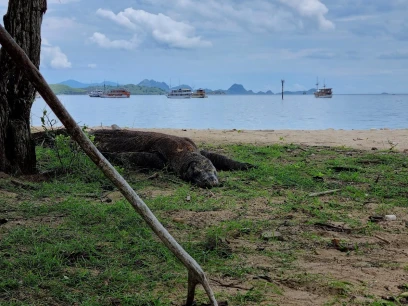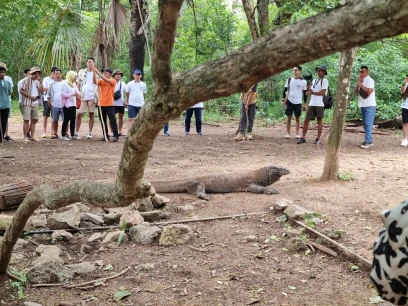The number of giant monitor lizard attacks on a village located in the national park on Komodo Island has been increasing recently.

In early November, a 45-year-old man named Kamaruddin was attacked by an "ora" (local name for Komodo dragons), and the lizard bit his leg. The man ended up in intensive care but survived. Kamaruddin became the third victim in the village in the last two months.
Another notable case of Komodo dragons attacking humans is related to a boy named Febrianto. This incident occurred in January 2021 when the child was three years old. Although his life was saved, Febri lost his left hand at the wrist. The village elder shared this information, stating that Febri is now attending first grade in the Komodo village.
On that day, the boy was fishing on the terrace of his stilt house, and the dragon, located beneath the house, grabbed a rope with its teeth and started pulling it. The boy fell down, and the dragon immediately attacked him, biting his hand and dragging him until the child's hand was torn off.
On the same day, Febri was promptly taken to the hospital in the administrative center of Labuan Bajo. His life was saved after undergoing intensive treatment. The village elder mentioned that Komodo dragons often enter human settlements, including the village's football field, as there is no fence separating the Komodo village from their habitat.
Komodo dragons are the largest existing lizards globally, typically ranging from 2.5 to 3 meters in length and weighing between 35 to 60 kg. Despite their size, they are agile and flexible. Currently, these dragons inhabit various islands in Indonesia, such as Komodo, Rinca, Flores, and Gili Motang. Fossil evidence found in Australia indicates an age of over 3.8 million years.
Adult Komodo dragons primarily feed on large hoofed mammals, including carrion, and sometimes they may even attack their own kind. In reserves, they are often supplemented with chicken feed. Komodo dragons can cause serious harm to the human body, leading to death without timely medical assistance, as their bites can result in sepsis.
Due to their excellent sense of smell, adult Komodo dragons can detect the faint scent of blood from a distance of more than 5 km. There have been cases where they attempted to attack tourists with minor open wounds. Women during menstruation are also at risk, so guides in the reserve usually warn visitors and provide instructions before their visit.


Tourist groups are accompanied by experienced rangers armed with long sticks with split ends to protect against possible attacks. Typically, such measures are sufficient, as Komodo dragons in tourist zones are satiated and do not display aggression without clear provocations. During excursions to Komodo Island, follow the instructions of local guides and avoid approaching dragons closely, even if they seem harmless and inactive.
Sources: detik.com/bali/nusra/d-7044758/kisah-bocah-selamat-dari-gigitan-komodo-meski-tangan-putusmedialabuanbajo.com/news/59710938231/kisah-mengharukan-bocah-digigit-komodo-selamat-meski-tangan-putussuaraburuh.com/daerah/53510930052/kisah-bocah-3-tahun-digigit-komodo-hingga-satu-tanganya-putus-walaupun-nyawanya-selamat
You can add one right now!